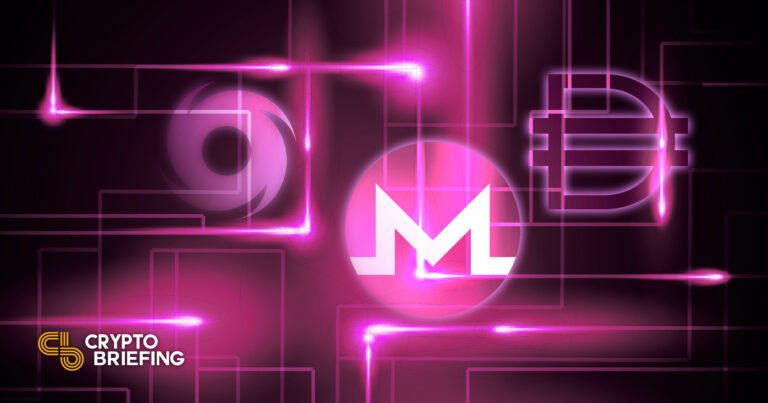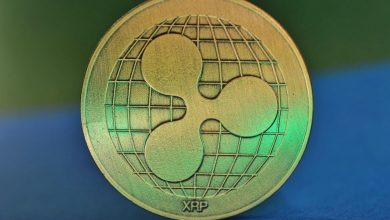Crypto Regulation Is Coming. Which Tokens Could Be Affected?

Key Takeaways
- The White Home’s new crypto framework and different developments out of Washington DC present that regulation is coming to the digital belongings house.
- The Treasury Division lately sanctioned Twister Money and will prolong its blacklisting to different privacy-focused initiatives.
- The likes of XMR, DAI, and XMR may endure amid elevated regulatory stress, however many different crypto tokens is also affected.
Share this text
A number of crypto initiatives may face enforcement motion below lately proposed regulatory tips.
U.S. Strikes Towards Crypto Regulation
The U.S. authorities is attending to grips with digital asset regulation.
In current months, feedback from key members of the Biden Administration, enforcement from regulators, and a number of other stories have make clear how the U.S. authorities intends to manage cryptocurrencies. Treasury Secretary Janet Yellen has been notably vocal in calling for digital asset regulation, particularly regarding dollar-pegged belongings. After the collapse of the TerraUSD stablecoin in Might, Yellen and a number of other members of Congress dedicated to drafting a complete stablecoin regulatory framework to assist defend U.S. traders. A draft of a brand new invoice regulating stablecoins launched final week features a two-year moratorium on “endogenously collateralized stablecoins” and would doubtlessly require all non-bank stablecoin issuers to register with the Federal Reserve.
The Securities and Change Fee and the Commodities and Futures Buying and selling Fee have additionally lately stepped up their crypto enforcement efforts. In July, the SEC accused crypto alternate Coinbase of itemizing “a minimum of 9” tokens that it believes must be labeled as securities. The regulator has additionally revealed it’s conducting investigations into all U.S.-based crypto exchanges after chair Gary Gensler indicated that he believed a number of platforms had been breaking securities legal guidelines by buying and selling towards their very own prospects. The CFTC, usually seen as extra lenient on crypto regulation than the SEC, has additionally sparked concern amongst crypto customers over the previous few days after it filed a first-of-its-kind case towards the decentralized autonomous group Ooki DAO for allegedly working an unlawful derivatives buying and selling platform.
Nonetheless, the majority of data concerning doable crypto enforcement got here from the White Home’s first crypto regulatory framework launched earlier this month. The doc detailed how a number of authorities businesses would search to supervise the expansion of the digital belongings house and deal with targets starting from selling entry to monetary providers to combating monetary crime.
With a lot documentation being drafted and launched, it’s changing into more and more obscure the way it will all work together with the present crypto panorama. Crypto Briefing takes a take a look at three cryptocurrencies that would face regulation below recently-released laws.
Twister Money (TORN)
After the Treasury Division sanctioned Twister Money, the privateness protocol’s TORN token is likely to be the obvious crypto asset that would face regulatory scrutiny sooner or later.
On August 8, the Treasury’s Workplace of Overseas Property Management introduced it had sanctioned the protocol as a result of it had “didn’t impose efficient controls” to forestall cybercrime-related cash laundering.
Twister Money lets customers deposit ETH or USDC from one Ethereum tackle and withdraw it to a different, breaking the road of traceability usually current on open ledger blockchains. Whereas many crypto natives have used the protocol for official functions akin to sustaining monetary privateness, it’s additionally turn into a well-liked avenue for cybercriminals seeking to launder stolen digital belongings.
The Biden Administration’s crypto regulatory framework has made it clear it intends to fight all types of crypto-related crime. The report factors to digital asset use among the many likes of Lazarus Group—a North Korean state-sponsored syndicate accountable for a number of main crypto hacks over the previous 12 months. With such a hardline response towards legal teams, any protocol serving to them launder their ill-gotten beneficial properties can be a first-rate goal for additional enforcement.
Though the U.S. has sanctioned Twister Money’s code, criminalizing any interplay with the protocol within the States, there’s little authorities can at the moment do to implement the ban. Nonetheless, many different DeFi protocols that want to serve U.S. customers have proactively complied with the sanctions, blocking addresses which have interacted with Twister Money from utilizing their providers.
In response to the enforcement motion towards Twister Money, TORN misplaced a major quantity of worth, dropping from an area excessive of $30.43 to $5.70 as we speak. Because the protocol’s builders have proven little curiosity in modifying Twister Money to assist it adjust to anti-money laundering rules, it’s unlikely that future U.S. crypto rules will do something however harm it and its token going ahead.
MakerDAO (MKR and DAI)
Whereas the Maker protocol and its overcollateralized DAI stablecoin haven’t but been implicated in any U.S. crypto regulation, customers anticipate that it would occur within the not-too-distant future.
MakerDAO co-founder Rune Christensen lately posted an “Endgame Plan” to the DAO governance discussion board, outlining how the protocol may place itself to climate future crypto regulation. In his proposal, Christensen advised lending out DAI towards real-world belongings and utilizing the curiosity earned to purchase ETH on the open market. The diploma to which MakerDAO efficiently accumulates ETH over the following three years will decide whether or not or not it ought to think about letting DAI drift from its greenback peg to turn into a free-floating asset.
Christensen believes that MakerDAO is probably going to attract consideration from U.S. regulators as a result of it points a dollar-pegged stablecoin. When this occurs, the Maker protocol could be unable to adjust to anti-money laundering sanctions much like these issued towards Twister Money even when it needed to. In Christensen’s eyes, it could be a greater long-term possibility to permit DAI to float from its greenback peg and turn into a free-floating asset, decreasing the regulatory burden positioned on the protocol.
In the interim, it seems unlikely that MakerDAO might want to implement any such plans. A newly launched draft of a Home Stablecoin Invoice produced below Yellen’s course suggests a extra conservative strategy to stablecoin regulation. Within the proposed draft, solely Terra-like stablecoins solely collateralized by tokens from the identical issuer would face enforcement motion. Nonetheless, the draft additionally requires all non-bank stablecoin issuers to register with the Federal Reserve to proceed serving U.S. customers. As the small print of such laws are but to be outlined, it’s unclear whether or not this requirement would imply MakerDAO is unable to conform.
If MakerDAO can not register as a non-bank stablecoin issuer within the U.S., it should doubtless influence the worth of the protocol’s MKR governance token. DAI may doubtlessly turn into a restricted asset throughout the States, and OFAC may even sanction the Maker protocol’s sensible contracts because it did with Twister Money. Whereas this case at the moment seems unlikely, it’s nonetheless price being attentive to MakerDAO’s regulatory threat.
Monero (XMR)
Final on our record isn’t an Ethereum protocol like Twister Money or Maker, however a whole blockchain—Monero.
Launched manner again in 2014, Monero is arguably essentially the most profitable privacy-focused blockchain that sees lively use and growth as we speak. Not like Bitcoin or Ethereum, which broadcast all transactions and pockets balances on a public ledger, Monero’s transactions are utterly personal. The community makes use of a number of privacy-preserving options akin to ring signatures, zero-knowledge proofs, stealth addresses, and IP tackle obscuring strategies to make sure privateness and anonymity for all customers.
Like Twister Money, Monero’s capability to obfuscate the possession and origins of cash has drawn the ire of regulators within the U.S. In 2020, the Inner Income Service began providing a money bounty of $625,000 to anybody who may efficiently crack Monero’s privateness and reveal customers’ transactions. Nonetheless, that bounty has by no means been claimed, which speaks to the power of Monero’s privateness expertise.
Nonetheless, Monero’s resilience is a double-edged sword. Whereas it could make utilizing the community extra interesting to these seeking to protect their monetary privateness, it additionally makes it a possible goal for additional regulation and enforcement motion. Just like Twister Money, cybercriminals use Monero for a variety of illicit actions. For instance, cybersecurity agency Avast has previously identified malware that makes use of the sufferer’s laptop to mine Monero and ship the income again to the virus’ creator.
Whereas Monero is a first-rate candidate for enforcement even below present rules, no motion has been taken towards it. Authorities have doubtless centered their efforts on protocols that facilitate a better quantity of illicit transactions (akin to Twister Money) as a substitute. Nonetheless, if the crypto house—and Monero—proceed to develop, it’s doubtless solely a matter of time earlier than OFAC dishes out additional sanctions towards privateness protocols.
As has been the case with Twister Money and TORN, any sort of enforcement towards Monero will virtually definitely have an effect on XMR. All U.S.-based crypto exchanges already refuse to simply accept Monero deposits or open spot markets for XMR as they will’t confirm if tokens have been procured via unlawful actions. Additional regulation, each from throughout the U.S. and overseas, will doubtless restrict entry to the blockchain or make sending transactions via it unlawful—and that may be unhealthy information for XMR.
The Way forward for U.S. Crypto Regulation
Whereas Twister Money, MakerDAO, and Monero are among the many crypto initiatives more than likely to be implicated by future rules, quite a few different tokens is also affected. Within the U.S., a minimum of, it’s doubtless that every one protocols that facilitate the buying and selling of precious crypto belongings might want to adjust to some type of anti-money laundering regulation sooner or later.
Moreover, these issuing their very own dollar-pegged stablecoins will doubtless face extra regulation, each as a result of perceived security of the greenback as a nationwide forex and the mounting pile of failed stablecoin initiatives which have value U.S. traders billions of {dollars}. Nonetheless, whether or not such regulation will harm crypto adoption or facilitate its adoption by the mainstream stays to be seen. Whereas some current instances from the SEC and CFTC seem to take a hardline strategy towards crypto, others just like the Home Stablecoin Invoice are comparatively lenient.
Whether or not these within the house prefer it or not, crypto regulation is coming. And those that are conscious and perceive the doable results can be higher positioned for the modifications than those that stick their heads within the sand.
Disclosure: On the time of penning this piece, the creator owned ETH, BTC, and a number of other different cryptocurrencies.





